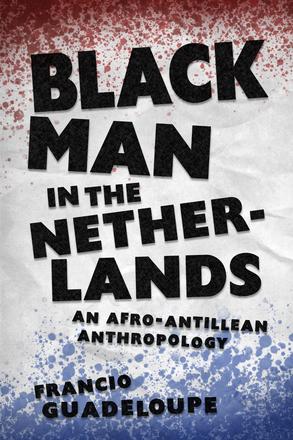
Black Man in the Netherlands
An Afro-Antillean Anthropology
A memoir and anthropological annunciation of how anti-racism is transforming the Caribbean and the Old World
Description
Francio Guadeloupe has lived in both the Dutch Antilles and the Netherlands. An anthropologist by vocation, he is a keen observer by honed habit. In his new book, he wields both personal and anthropological observations. Simultaneously memoir and astute exploration, Black Man in the Netherlands charts Guadeloupe’s coming of age and adulthood in a Dutch world and movingly makes a global contribution to the understanding of anti-Black racism.
Guadeloupe identifies the intersections among urban popular culture, racism, and multiculturalism in youth culture in the Netherlands and the wider Dutch Kingdom. He probes the degrees to which traditional ethnic division collapses before a rising Dutch polyethnicity. What comes to light, given the ethnic multiplicity that Afro-Antilleans live, is their extraordinarily successful work in forging an anti-racist Dutch identity via urban popular culture. This alternative way of being Dutch welcomes the Black experience as global and increasingly local Black artists find fame and even idolization.
Black Man in the Netherlands is a vivid extension of renowned critical race studies by such Marxist theorists as Achille Mbembe, Paul Gilroy, Stuart Hall, and C. L. R. James, and it bears a palpable connection to such Black Atlantic artists as Peter Tosh, Juan Luis Guerra, and KRS-One. Guadeloupe explores the complexities of Black life in the Netherlands and shows that within their means, Afro-Antilleans often effectively contest Dutch racism in civic and work life.
Reviews
"Black Man in the Netherlands is an important addition to the literature of the complex relationship between people of the Dutch Caribbean and their ties to the Netherlands. Though written in the genre of the memoir, it provides a rich ethnographic account of what it means to be Black and Caribbean, while navigating the cultural, racial, and immigrant spaces of the Netherlands. Provocative and erudite, this book is reflective and personal, while simultaneously inviting the reader to plumb the depths of existential racism, activism. "
- Linden F. Lewis, coauthor of Caribbean Masala: Indian Identity in Guyana and Trinidad and editor of Caribbean Sovereignty, Development and Democracy in an Age of Globalization
"This book addresses the notion of race in a visceral, personal way. . . . It is unique in its honesty and rawness. Guadeloupe opens the door to his world and invites the reader in, offering personal accounts of lived experience that is also supported by scholarship."
- Jason N. Vasser-Elong, Canadian Journal of Netherlandic Studies
"The new book of Francio Guadeloupe is an (auto) ethnographic engaged and beautifully written account of urban life and popular culture in relation to Blackness and questions of identity and anti-Black-racism in the Netherlands. . . . Through showing that categorizations are abstractions and not lived realities this book proposes an inclusive way to think about, theorize on and combat anti-Black racism as a cultural practice and politics “from below”. In that sense it is also a very hopeful book and a must read for all interested in ethnic and racial studies and debates on de- and postcolonialism, urban popular culture, belonging and questions of Citizenship."
- Tine Davids, Ethnic and Racial Studies
"As readers we are reminded of the fact that we have a choice about how we perceive the world. Guadeloupe’s concept of Urban Blackness allows us to build a meta identity that surpasses the classic race identification and gives us agency in creating our own narratives. This book inspired me, and will hopefully inspire many more academics to embrace complexity, plurality, and optimism in our attempts to contribute to the creation of a liberated, nonracist, nonoppressive society."
- Martine Beijerman, new West indies Guide